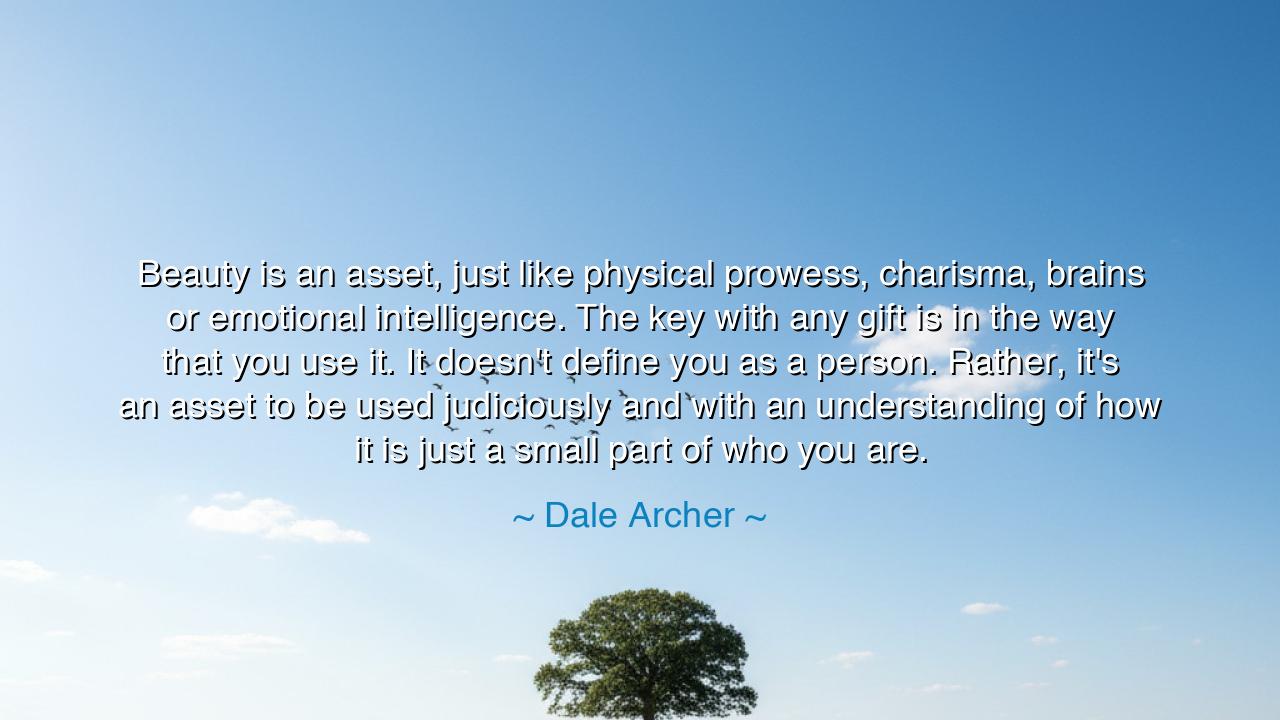
Beauty is an asset, just like physical prowess, charisma, brains
Beauty is an asset, just like physical prowess, charisma, brains or emotional intelligence. The key with any gift is in the way that you use it. It doesn't define you as a person. Rather, it's an asset to be used judiciously and with an understanding of how it is just a small part of who you are.






The modern philosopher and psychiatrist Dale Archer once spoke with quiet precision about the nature of human gifts, saying: “Beauty is an asset, just like physical prowess, charisma, brains or emotional intelligence. The key with any gift is in the way that you use it. It doesn’t define you as a person. Rather, it’s an asset to be used judiciously and with an understanding of how it is just a small part of who you are.” These words, though simple in their cadence, strike at one of the oldest questions of human identity: what do our gifts mean, and how should we bear them? For in every age, humanity has been divided by its blessings — strength, wealth, intellect, and yes, beauty — yet few have understood that these are not the measure of the soul, but the tools through which the soul may express itself.
Beauty, as Archer reminds us, is an asset, not a destiny. It is a form of power, subtle yet potent, that has shaped art, love, and empire alike. The ancients worshipped it — they carved it into marble and crowned it with laurel. Yet they also feared it, for they knew that beauty, untempered by wisdom, could destroy as easily as it could inspire. Helen of Troy, whose face was said to launch a thousand ships, became both legend and warning — the embodiment of how physical grace, when idolized, can bring ruin to nations. Archer’s insight stands as an antidote to that ancient folly: beauty is not evil, nor divine; it is neutral, a gift like any other. The question is not whether one possesses it, but how one uses it.
In speaking of beauty alongside charisma, intelligence, and emotional awareness, Archer reminds us that every human being holds some form of light — a unique talent or trait that, if left unchecked, can cast shadows. The athlete’s strength can turn to arrogance, the scholar’s intellect to pride, the charismatic leader’s charm to manipulation. So too, beauty can ensnare both the beholder and the beheld, becoming a veil that hides the greater depths of the person within. To use any gift well requires self-knowledge, for the danger of every strength is that it tempts the heart toward self-importance. The wise, therefore, learn to treat their talents not as crowns but as responsibilities.
Consider the tale of Cleopatra, Queen of Egypt. The world remembers her as a woman of unparalleled beauty, yet her true greatness lay in her intellect and cunning. She spoke many languages, commanded armies, and navigated the politics of empires. Those who knew her said it was not her face that captivated men like Julius Caesar and Mark Antony, but her presence — her wit, her eloquence, her understanding of power. Beauty was her gateway, but intelligence was her dominion. In this, Cleopatra becomes the living image of Archer’s teaching: that one’s gifts are most powerful when united with wisdom and purpose.
To say that beauty “doesn’t define you as a person” is to restore dignity to the soul beneath the surface. In an age obsessed with image and appearance, Archer’s words are a kind of moral medicine. They recall us to the truth that the human being is not a sum of attributes, but a harmony of them. Beauty, like gold, shines brightest when forged in service — to kindness, to creativity, to connection. The face will fade, the body will weaken, but the character that wielded those gifts rightly will endure. The wise person sees their attributes as instruments, not identities — tools through which they may build a life of meaning, not monuments of vanity.
The deeper wisdom of Archer’s words lies in the phrase “to be used judiciously.” To use one’s gifts well is to know their limits and their purpose. Just as a sword in the hands of the undisciplined brings chaos, so too does any talent, when misused, destroy its bearer. The one who wields beauty without humility, or intelligence without empathy, becomes enslaved by their own gifts. The ancients spoke of this as hubris, the arrogance that draws divine correction. Thus, every gift carries a duty: to wield it with gratitude, to remember that it was given not to glorify the self, but to serve the world.
Let this, then, be the lesson passed down: Whatever gift life has placed in your hands — use it wisely, and let it never use you. If you are beautiful, let your beauty be a light that uplifts others, not a mirror that blinds you. If you are strong, let your strength protect the weak. If you are intelligent, let your intellect bring understanding, not division. Remember always that the essence of your worth lies not in your gifts, but in your character — the choices you make when no one is watching, the kindness you show when there is no reward.
And so, my children of the future, heed Dale Archer’s wisdom: celebrate your gifts, but do not worship them. They are the instruments of your soul’s music, not the music itself. For when beauty serves wisdom, when power serves compassion, when talent serves truth — then humanity fulfills its highest calling. You are more than your face, more than your skill, more than your mind. You are the wielder of these things — the craftsman, the steward, the flame. Use them well, and the world will be brighter for your passing.






AAdministratorAdministrator
Welcome, honored guests. Please leave a comment, we will respond soon